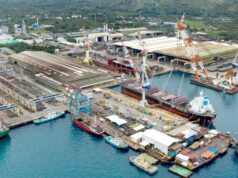SWS: 1 in 4 Filipinos aware of federal system of government
ONE in four Filipinos who make up 25% of respondents know about the federal system of government, while 75% said they learned about it only during the survey, according to the Social Weather Stations (SWS).
The First Quarter 2018 Social Weather Survey, conducted March 23-27, also found that 37% agree with the federal system of government (consisting of 14% who strongly agree and 23% who somewhat agree), 29% disagree (12% who somewhat disagree and 17% who strongly disagree), and 34% were undecided about the matter.
This gives a net agreement score +7 (% agree minus % disagree, correctly rounded), classified by SWS as neutral. The SWS terminology for net agreement is as follows: +50 and above, “extremely strong”; +30 to +49, “very strong”; +10 to +29, “moderately strong”; +9 to -9, “neutral”; -10 to -29, “moderately weak”; -30 to -49, “very weak”; -50 and below, “very weak”; -50 and below, “extremely weak.”

NAMES OF STATES
The survey also found that 58% don’t know the name of the “state” being promoted in their locality.
“Of the 31% who were able to provide names, the top responses were Philippine State/State of the Philippines/United States of the Philippines (2%), Dinagat State/State of Dinagat/United States of Dinagat (2%), State of Davao/Davao State (2%), and State of Cavite/Cavite State/United States of Cavite (2%),” SWS said.
The rest of the names mentioned by respondents — such as State of Pampanga, State of Quezon City, and State of Laguna — obtained 1% or less.
SWS said awareness about the federal system of government was highest in Mindanao at 37%, followed by Metro Manila at 28%, Visayas at 22%, and Balance Luzon at 20%.
It was also in Mindanao that support for the federal system was highest, with a very strong net agreement score of +43 (59% agree, 16% disagree), followed by Metro Manila at a neutral +7 (38% agree, 31% disagree), Visayas at a neutral +2 (32% agree, 30% disagree), and Balance Luzon at a neutral –8 (27% agree, 35% disagree).
Awareness was slightly higher in rural areas at 27%, compared to urban areas at 24%. On the other hand, net agreement with the federal system was higher in urban areas at a moderately strong +11 (39% agree, 28% disagree), compared to rural areas at a neutral +4 (34% agree, 30% disagree).
Awareness was also highest among college graduates at 53%, followed by high school graduates at 26%, non-elementary graduates at 17%, and elementary graduates at 16%. Support for the federal system of government was stronger among those with more years of formal schooling: it was highest among college graduates at a moderately strong +27 (50% agree, 23% disagree), followed by high school graduates at a neutral +5 (37% agree, 32% disagree), non-elementary graduates at a neutral +4 (28% agree, 24% disagree), and elementary graduates at a neutral +3 (33% agree, 30% disagree).
By religion, awareness about the federal system was highest among Muslims at 51%, followed by Iglesia ni Cristo members at 37%, other Christians at 32%, and Catholics at 22%. Support for the federal system of government was also highest among Muslims at a very strong net agreement score of +47 (61% agree, 14% disagree), followed by other Christians at a neutral +9 (35% agree, 26% disagree), Catholics at +4 (35% agree, 30% disagree, correctly rounded), and Iglesia ni Cristo members at +2 (39% agree, 37% disagree).
The noncommissioned survey used face-to-face interviews of 1,200 adults (18 years old and above) nationwide: 300 each in Metro Manila, Balance Luzon, Visayas, and Mindanao, with sampling error margins of ±3% for national percentages and ±6% each for the said areas.
‘INFORMATION DRIVE’
In response to the survey, Presidential Spokesperson Harry L. Roque, Jr. said, “Well apparently, the information drive is not enough. We’ll need to work harder given that the shift to federalism is the cornerstone of the Duterte administration.”
For his part, Constitutional Commission spokesperson Conrado I. Generoso noted the period of the survey when “Concom was barely a month old. We convened February 19. Fairly this is very much understandable and that’s why we are conducting these media briefings as often as we can because really part of the responsibility is with you guys. The country needs your help. We are asking media to give the stories about ConCom, about the proposed changes in the Constitution, about federalism whether the story is for or against.”
He also said: “The survey is very much encouraging to us because of the details provided here. For instance it says the result of the survey is +7 or neutral, meaning when you deduct those who disagree from those who agreed, the result is +7 and the number of undecided is very high at… 34%, which makes that, really, if we go out and tell the remaining… 34% of the people, I’m very sure they’ll be convinced. They will be convinced that this is the way forward for this country.”
ConCom member Susan U. Ubalde-Ordinario said for her part: “It’s very encouraging for us because we now know that with a little more effort on our part to reach out to the public, I think we will be able to really convey the message and the importance and their responsibility in this whole thing.”
For his part, Senator Francis N. Pangilinan, who heads the Senate committee on constitutional amendments and revision of codes said in a statement: “The latest survey result is consistent with past survey results, which also showed little knowledge about the planned new form of government.”
He added: “Our previous hearings sought to answer the following questions: Is there a need to change the Constitution? If yes, what provisions and why? Who should amend the Constitution? Legislators as a constituent assembly? Or elected delegates in a constitutional convention? If con-ass, should the Senate and the House of Representatives vote jointly or separately?” —with Camille A. Aguinaldo and Arjay L. Balinbin



